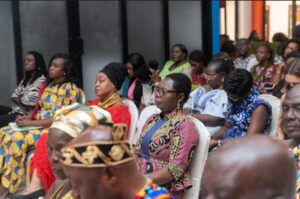A study conducted by the Girls Excellence Movement (GEM) to explore and highlight the underlying challenges affecting girls’ education in the country has revealed that more than half of female students have been abused sexually.
The study involved 2,000 girls across 15 schools located within four regions in southern Ghana – Greater Accra, Volta, Central and Eastern – from February 2019 to September 2021, and said the situation has caused depression, trauma, panic-attacks and anxiety among the students, and is having a toll on their education and wellbeing.
It added that according to the girls, individuals who sexually abuse them include teachers, schoolmates, friends, uncles and family-friends.

This makes the situation alarming, as these individuals in one way another are constantly in the lives of the 54.3 percent of these girls who were within the age-range of 17-22 years and 45.7 percent of them who were between the ages of 11 and 16 years respectively.
“About 34 percent of the girls want training in how to develop confidence. We found that about 50.4 percent of girls are being raised by guardians other than both parents, exposing them to financial difficulties which further makes them vulnerable to sexual exploitation – with trauma flashbacks and other mental health challenges affecting their ability to make the best out of school. 43 percent of the respondents have experienced one form of abuse or another. And 51.9 percent of them have been sexually abused,” the report indicated.
Also, from the findings, 80 percent of the girls look up to people in their immediate family, yet the data also revealed parents as the highest perpetrators of physical and verbal abuse.
Sexual education
The report, themed ‘Sheltered Yet Exposed’, added that there is little knowledge on sexual education among the students, as “one in four girls is in a non-platonic relationship with little or no sex education”.
On Science, Technology, Engineering and Mathematics (STEM), about one in two girls find mathematics and other STEM subjects difficult, though they are aspiring to careers in the health and medical sciences.
It is against this background that Executive Director-Institute for Education Studies (IFEST), Peter Anti Partey, presented the report’s findings and called on government to take notice of issues on the ground to employ pragmatic measures which address the challenges.

The report holds that: “School-related gender-based violence, financial difficulties, personality-development factors such as lack of confidence and self-worth, stereotypical fears toward STEM subjects, lack of clarity on career path choices, sexual abuse and related medical and mental health factors, family influence – the desire for it or the lack thereof -are the factors affecting girls’ progression in higher education in Ghana”.
In light of this, GEM recommends deliberate girl-focused institutional reforms in the education sector, especially in the area of guidance and counselling units within pre-tertiary institutions.
“Over 50 percent of girls have been sexually abused; in view of this finding, we wish to propose a review of Chapter Six of the Criminal Offences Act, 1960 (ACT 29) to include provisions aimed at prevention, victim protection, retribution and awareness-creation to eliminate sexual assault – against not only girls but boys as well. We are appealing for government to make the acquisition of medical reports free for victims of gender-based violence, especially rape victims, to facilitate the justice delivery process,” it added
Eradication of sanitary pad 20 percent tax
GEM further recommends eradication of the 20 percent tax on sanitary pads. This tax, it argues, makes the essential commodity expensive and unaffordable for girls in deprived communities – saying that from the findings 62.5 percent of the girls reported having financial difficulties, a situation that reveals their inability to afford basic necessities including sanitary pads… which further exposes girls to various forms of exploitation.
They further propose STEM-focused interventions; increased parental attention to girls; and the involvement of religious and traditional leaders in awareness-creation toward building a nurturing society that values girls’ education and provides an enabling environment for them to thrive and become powerful and transformational leaders.










